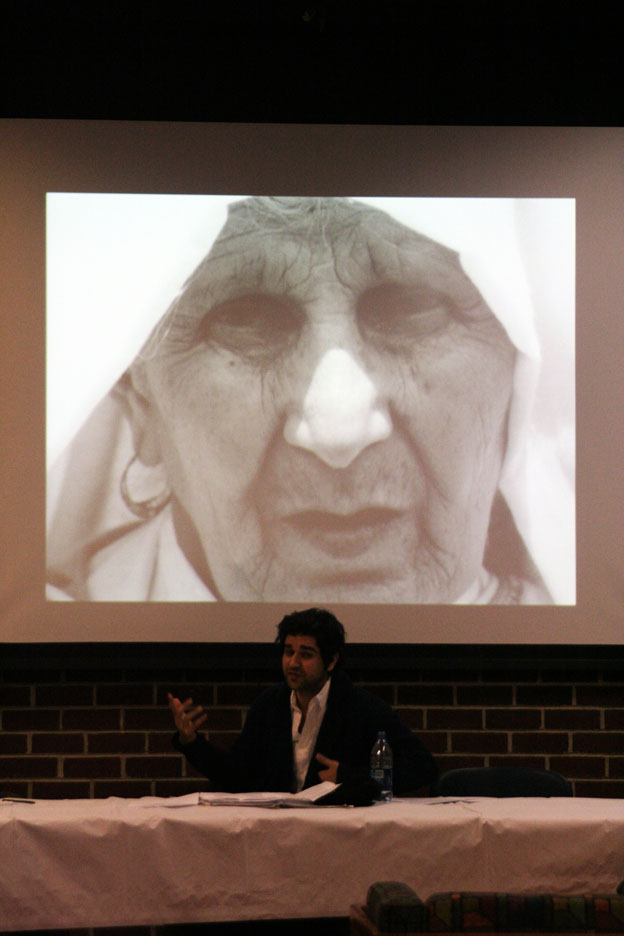Fordham Alumnus Raises Awareness for Human Rights in Kashmir
June 6, 2011
Published: December 29, 2009
“The Kashmir conflict is one of the most neglected conflicts in the world, and also one of the most urgent,” Fordham alumnus Mohsin Mohi-Ud Din said to an intimate crowd in the Student Lounge on Jan. 15, launching the Students for Solidarity event entitled Dispatch from Kashmir. The event focused on Mohi-Ud Din’s recent experiences and research in the war-ridden Kashmir Valley.

“The world is on fire right now—everywhere.” Mohi-Ud Din’s warning echoed a stark projector-screen image of a man facedown on a dirt road. The fallen man was a native of the tumultuous Kashmir Valley region, located at the northwestern end of India, where its borders with neighboring Pakistan and China are disputed. Since its first armed revolution in 1989, Kashmir has been the center of an intense territorial conflict, in which approximately 70,000 civilians have been killed, according to Mohi-Ud Din. The lecture concentrated primarily on the Indian-administered region, where the struggle is not simply a question of border placement, but an ethnic conflict as well; the Indian military, mostly Hindu, is pitted against a population of Muslim, Pakistani residents.
“I’ve had relatives tortured, friends beaten,” Mohi-Ud Din said, nodding upwards at a projector-screen photograph of his aunt’s grave, her teenage son mourning beside it. Next was a black-and-white image of her husband, a sober expression on his face. Some time after his wife’s death, he was beaten severely on the street while he was trying to buy milk for his children.
This type of civilian abuse is not uncommon, according to another victim, whom Mohi-Ud Din quoted as saying, “To walk outside the gates of one’s home feels like walking in a field of mines.”
The presentation was interspersed with similar sentiments from civilians that Mohi-Ud Din interviewed during his time in the area. After graduating from Fordham College at Rose Hill (FCRH) in 2007, Mohi-Ud Din’s work with New York-based non-profit Human Rights First, along with his family ties to the Kashmir area, led his post-undergraduate endeavors to the contested region. Mohi-Ud Din said that he will soon be teaching music to orphans in Morocco as a Fulbright Fellow—a slight departure from his role as the drummer of indie-alternative-rock band Zerobridge, named for an actual bridge in Kashmir.
His journalistic efforts in the Kashmir area have earned him a contributing position to the Huffington Post, which he hopes will help raise awareness about the conflict in Kashmir—specifically, awareness about the crimes perpetrated by the Indian military against Muslim civilians in Indian-administered Kashmir—that are largely ignored by the media.
The parallel between the civilian casualties in Kashmir and those in the Gaza Strip—a more widely publicized territorial dispute—ran consistently throughout the presentation. Like the Kashmiris, residents of the Gaza Strip, many of whom are Palestinian refugees, have been subject to numerous attacks over the land on which they live. The conflict is between Israel, the region’s official occupier, and two rival Palestinian factions, Fatah and Hamas, the latter of which the U.S. and Israel have deemed a terrorist group, according to the New York Times.
The conflict in Gaza has been at the center of media attention in recent weeks after Israel launched an attack on the region that left 1,300 Palestinian civilians dead, as CNN reported on Jan. 19. Mohi-Ud Din stressed the importance of supporting the people rather than their governments, and he blamed the Palestinian casualties on both the hostile Israeli regime and on the corrupt Hamas leaders.
“Too often the needs of the people get marginalized in talking about politics,” he said, cautioning his audience to be wary of common conceptions of people living in these war-ridden areas. He cited a specific instance in which the Indian military murdered an innocent Kashmiri civilian, then attempted to force his doctors to sign forms stating that the man was a terrorist.
“The media makes the victims look like the perpetrators and the terrorists,” Mohi-Ud Din said. “These people do not support terrorism because they are the victims of terrorism.”
Despite the somber nature of much of the lecture, there were uplifting moments, most notably in the series of photographs of the Kashmir Valley’s rural landscapes and cultural landmarks.
“It’s one of the most beautiful places I’ve ever seen in my life,” Mohi-Ud Din said, noting, “It’s one of the reasons so many people lay claim to it.” This sense of the land’s inherent hope played into the speaker’s final point, that “the story of the Kashmiris is actually one of triumph.” Through suffering, these people still manage to keep their daily lives as normal as possible, refusing to give up hope for a peaceful future, Mohi-Ud Din explained. He encouraged the audience, as Americans, to take this hope to heart and to work to ensure the rights of the Kashmiri people.
“What happens in Kashmir… or Gaza directly affects our lives here,” he said. “You are empowered to do something.”
Above all else, Mohi-Ud Din emphasized the necessity of raising awareness and initiating discussion about the crisis in Kashmir. Those interested in getting involved, or those who would like to learn more, can contact the International People’s Tribunal on Human Rights and Justice in Indian-Administered Kashmir or visit its Web site at www.kashmirprocess.org.









